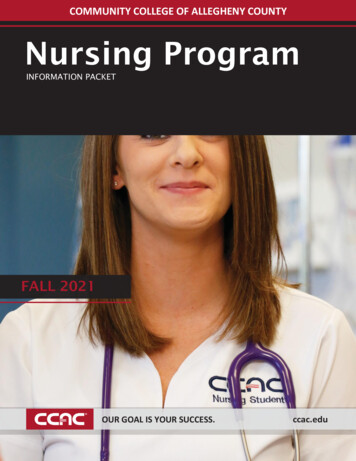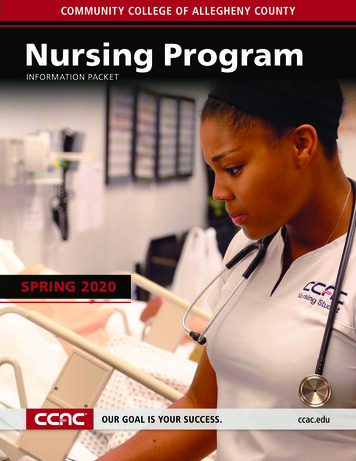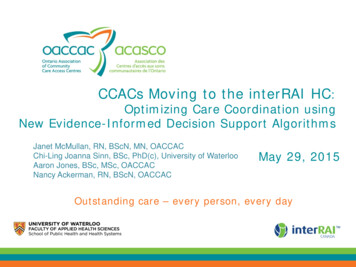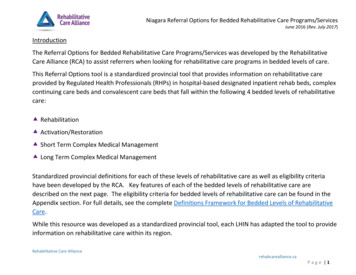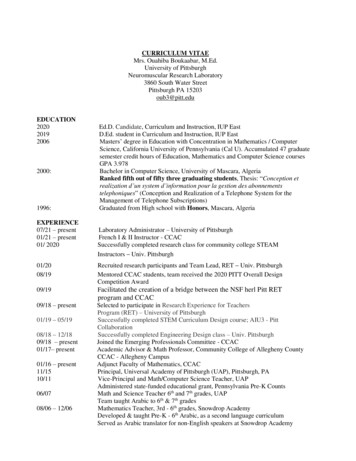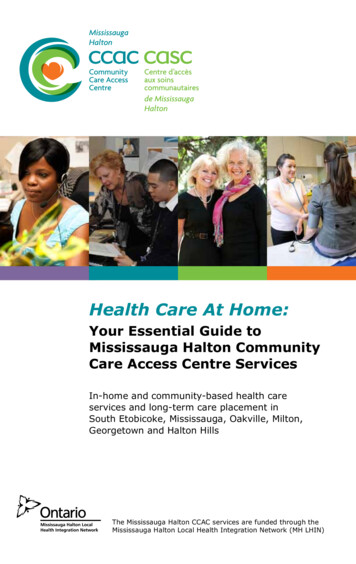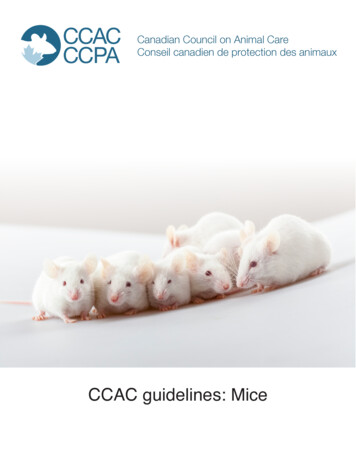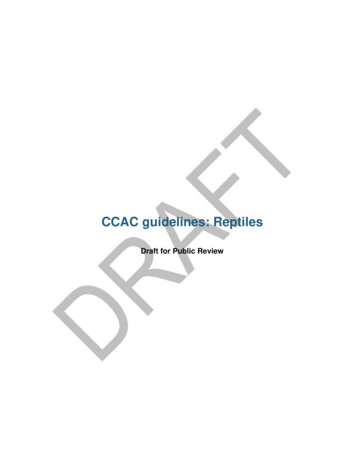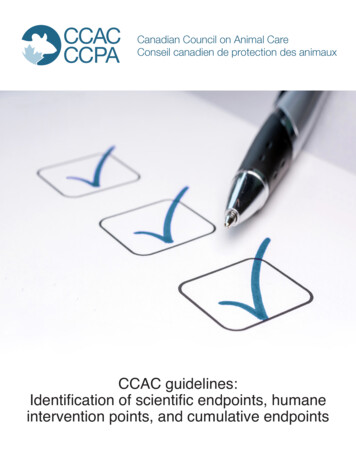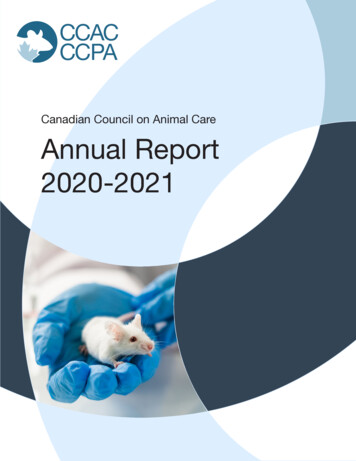
Transcription
CCACCCPACanadian Council on Animal CareAnnual Report2020-2021
AcknowledgementsWe would like to take this opportunity to thank our member organizations, as well asour funders, for their ongoing support and involvement.Member OrganizationsAgriculture and Agri-Food Canada (AAFC)Association of Canadian Faculties of Agriculture and Veterinary Medicine (CFAVM)Association of Canadian Faculties of Dentistry (ACFD)Association of Faculties of Medicine of Canada (AFMC)Canadian Association for Laboratory Animal Medicine (CALAM)Canadian Association for Laboratory Animal Science (CALAS)Canadian Bioethics Society (CBS)Canadian Cancer Society (CCS)Canadian Council of Departments of Psychology (CCDP)Canadian Food Inspection Agency (CFIA)Canadian Society for Ecology and Evolution (CSEE)Canadian Society of Zoologists (CSZ)Canadian Veterinary Medical Association (CVMA)Defence Research and Development Canada (DRDC)Environment and Climate Change Canada (ECCC)Fisheries and Oceans Canada (DFO)Health Canada (HC)Heart and Stroke Foundation of Canada (HSFC)Humane Canada Innovative Medicines Canada (IMC)National Research Council of Canada (NRCC)Universities CanadaFundersCanadian Institutes of Health Research (CIHR)Natural Sciences and Engineering Research Council of Canada (NSERC)CCAC Annual Report 2020-2021 Canadian Council on Animal Care, 2021ISBN: 978-0-919087-92-7HOW TO REACH USCanadian Council on Animal Care190 O’Connor St., Suite 800, Ottawa, ON K2P 2R3613-238-4031 ccac@ccac.ca www.ccac.ca
CCACCCPATable of ContentsAnnual Report2020-2021MESSAGE FROM THE CHAIR. 1MESSAGE FROM THE EXECUTIVE DIRECTOR. 2OUR VISION, MISSION, AND MANDATE. 3OUR PRINCIPLES. 4OUR PROGRAMS. 5THIS YEAR IN HIGHLIGHTS. 6Effects of the COVID-19 Pandemic. 72020 Harry C. Rowsell Award. 8Our Five Goals. 9GOAL 1. 10GOAL 2. 12GOAL 3. 14GOAL 4. 16GOAL 5. 18Financial Statements. 20A LOOK FORWARD:THE CCAC STRATEGIC PLAN 2021-2026. 21CCAC GOVERNANCE. 22Board of Directors. 23Standing Committees. 24Member Organizations. 26Secretariat. 27CCAC VOLUNTEERS. 28Contributors to Guidelines Development . 29Contributors to Other Projects . 34Members of CCAC Assessment Panels. 36i
Message from the ChairThis past year has certainly been unprecedented and unpredictable.Never could we have imagined having to face a global pandemic and allof its attending ramifications. Despite the challenges, I would like to takethis opportunity to commend those within CCAC-certified institutions scientists, animal care committees and coordinators, animal welfareexperts, senior administrators, facility managers, animal care technicians,veterinarians, and all those who care for and use animals in science - fortheir dedication and determination when it came to ensuring that properprotocols were in place and followed, and that the welfare of the staff andthe animals in their charge were kept top of mind.CCACCCPAAnnual Report2020-2021I would also like to thank the members of the CCAC Secretariat. Yourresilience and ability to adapt during the pandemic has been remarkable,as was your ability to find ways to address the challenges faced by ourstakeholders. This year was not an easy one and we sincerely appreciateyour commitment.This year was also a challenging time in which to tie up and conclude theCCAC’s 2015-2020 strategic plan and associated activities. Although this isthe last year that the CCAC will report on these five strategic goals, our worktoward the improvement of the ethical care and use of animals in sciencecontinues. In fact, it is thanks to our successes over the past five years thatwe have a strong foundation to move forward during this challenging time.One of the most important lessons of the pandemic has been the necessityfor agility and responsiveness. Throughout this past year, the scientificcommunity has had to shift not only its processes, but its mindset. TheCCAC must therefore also learn to pivot more quickly to meet the changingneeds of this evolving scientific landscape by working to improve thestandard of care for animals in science, reduce administrative burden,and enhance our methods of communications and training. We haveincorporated these elements into the CCAC’s new strategic goals and plan,which will take us from 2021 to 2026. We are excited for the direction theorganization will take over the coming years.Our focus will be on continuing to build an inclusive culture, one in whichcertified institutions, animal welfare organizations, and the Canadianpublic can all see themselves reflected in our priorities and our work.Public trust is a vital component in the ethical care and use of animals inresearch, teaching, and testing in Canada, and we must never lose sightof our responsibility in that area. We will strive to maintain a culture ofoversight and compliance that will give the public confidence that, whilewe are advancing science in this country, we are doing so in a manner thatensures high ethical standards of care and use are maintained regarding theanimals involved.As we close this strategic plan and reflect on the successes of the last fiveyears, we can also look forward to building upon these initiatives and movingthe needle ever forward in continually improving the ethical care and use ofanimals in science. Thank you for your role in this endeavour. Without yourcollaboration and dedication, we could not deliver on our mandate.Dr. Christopher R.J. KennedyChair, CCAC Board of Directors1
Message from the Executive DirectorAs with most organizations around the world, COVID-19 loomed large atthe CCAC in 2020. In this new and unexpected reality of lockdowns andquarantines, we worked diligently with our program participants to ensurethat they had the tools and information they needed to maintain the healthand safety of both their animals and staff.CCACCCPAAnnual Report2020-2021Most of the major operational changes occurred within the Assessment andCertification team, with the suspension of travel and the implementation ofvirtual assessments and facility visits. A number of processes and policieswere also modified to meet the needs of this new reality, which certifiedinstitutions applied quickly and effectively.During this time, the Standards team was also busy drafting and publishingnew guidelines and related documents, including the publication of CCACguidelines: Zebrafish and other small, warm-water laboratory fish, and theCCAC Revised Guidance on Euthanasia Using Carbon Dioxide, which replacesthe guidance concerning carbon dioxide use in the CCAC guidelines on:euthanasia of animals used in science (2010). Guidelines documents on animalwelfare assessment, amphibians, wildlife, and more will hopefully seepublication in the coming fiscal year.Due to the pandemic, the CCAC National Workshop 2020 in Toronto wasunfortunately cancelled, as was a planned regional workshop. However,our team is currently focused on new, virtual offerings for the coming year,including an online national workshop.Staff and volunteers finalized the CCAC Strategic Plan 2021-2026, work thatbegan in the fall of 2018 and included engagement with CCAC members andother stakeholders through strategic planning sessions and surveys. Thenew strategic plan dovetails nicely with our recent strategic goals, whichyou can see in the “Moving Forward” section for each of the goals in thisannual report.The CCAC could not achieve its goals or continue to meet its mandatewithout the hard work of the Secretariat team, and I would like tothank them for their perseverance and dedication in the face of suchunprecedented circumstances. I would also like to thank our manyvolunteers who have, despite considerable upheaval in their own livesand careers, contributed thousands of hours to virtual assessment panels,committees, task forces, and working groups.Mr. Pierre VerreaultCCAC Executive DirectorThis has been an incredibly challenging year and one that has taught usmany lessons. The CCAC is committed to applying this new knowledge andbecoming more responsive to the needs of our stakeholders. We may notknow what the future will bring, but I do know that the CCAC is up for thechallenge. Through our 2021-2026 strategic plan, we have charted a coursefor the organization that will not only create stronger engagement andattract new entities to the CCAC but will also improve animal care and useprograms in institutions across Canada.2
CCACCCPAOur Vision, Mission, and MandateAnnual Report2020-2021Our VisionThe highest standards of animal ethics and care are valued and assured inall animal-based science conducted throughout Canada.Our MissionThe CCAC works to ensure that animal-based science in Canada takes placeonly when necessary and that the animals in the studies receive optimal careaccording to high-quality, research-informed standards.Our MandateActing in the interest of the people of Canada, the CCAC advances animalethics and care in science by: developing science-informed standards that incorporate expert opinion,the values of Canadians, and strategies to reduce the need for, and harmof, animals in science, while promoting their well-being; encouraging the implementation of the highest standards of ethicsand care for animals in science in collaboration with the animal-carecommunity and scientists across Canada; providing assessment and certification programs that empower scientificinstitutions in achieving high standards of animal ethics and care; and providing education, training, and networking opportunities to supportindividuals, animal care committees, and institutions in implementingour guidelines and sharing best practices in the oversight of animalethics and care in science.3
CCACCCPAOur PrinciplesAnnual Report2020-2021Respect for Animal LifeRespect for animal life is the driving force behind all of CCAC’s standardsdevelopment and assessment and certification activities.EvidenceCCAC standards are based on expert peer advice and current interpretationof scientific evidence.TransparencyThe CCAC operates in a manner that is transparent and fair, and open topublic scrutiny.PartnershipThe CCAC works in partnership with its member organizations, programparticipants, and stakeholders to advance animal ethics and care in science.InclusivenessThe CCAC works with all stakeholders, seeking advice and perspectivesfrom peer experts and public representatives to achieve consensus on issuessurrounding animal ethics and care in science.IntegrityThe CCAC conducts all activities and affairs with honesty and always acts inaccordance with high ethical standards.4
CCACCCPAOur ProgramsAnnual Report2020-2021Assessment and CertificationThe Assessment and Certification team collaborates with over190 animal care committees and a strong network of volunteerexperts to ensure the appropriate and consistent implementationof CCAC standards across Canada. By providing independent,third-party quality assurance to ensure the proper application ofCCAC standards of ethical animal care and use, Assessment andCertification maximizes the opportunity for information exchangethrough peer review and stakeholder involvement, and promotesgood animal practices, including Three Rs alternatives.StandardsThe Standards team is responsible for developing, reviewing,and revising guidelines. Together with its invaluable volunteerexperts, Standards is working to ensure that its documents aretimely and relevant, and informed by expert peer advice, nationaland international knowledge, and Canadian values. The ThreeRs, a widely accepted tenet of ethical animal care and use, is atthe heart of the CCAC’s standards, encouraging institutions toimplement replacement, reduction, and refinement practices intheir work.Training and NetworkingThe Training and Networking team supports the CCAC communityby providing a full range of networking activities and resources.The CCAC’s stakeholders have access to online training tools andmodules, which help institutions better tailor their programs tothe specific training needs of their researchers and educators.This business line also organizes the annual CCAC nationalworkshop, which features plenary sessions, breakout sessions,and networking opportunities that foster peer interaction andknowledge exchange on various challenges and best practices inthe ethical care and use of animals in science.5
CCACCCPACanadian Council on Animal CareAnnual Report 2020-2021This Year in HighlightsIn Canada and abroad, animals are studied in the wild, on farms, andin research facilities for science. From biomedical laboratories whereresearchers study fundamental science, to veterinary colleges wherestudents learn to treat animals, to national parks where biologistsstudy wildlife populations – wherever animals are being studied orhandled, the CCAC and its network of volunteer experts are there toensure the highest standards of ethical animal care and use.
CCACCCPAEffects of the COVID-19 PandemicAnnual Report2020-2021The COVID-19 pandemic has affected everyone, regardless of role,organization, or location, and will dramatically change the wayorganizations and people operate moving forward.Within the CCAC’s community, significant impact was borne by both theanimals used in scientific programs, and the individuals tasked with caringfor them and ensuring their welfare. From the onset of the pandemic,program participants and the CCAC moved quickly to ensure thewell-being of both of these vulnerable groups. The CCAC implementedvirtual assessments, including real-time virtual visits of animal facilitieswhere possible. While nothing can fully replace an in-person assessmentvisit, the CCAC would like to thank its program participants and volunteersfor their patience, diligence, hard work, and dedication in adapting to thenew virtual process, and for ensuring the continued care and welfare of theanimals in their charge.The CCAC is currently working with certified institutions to collectinformation regarding changes to animal use directly related to COVID-19.Once the data are compiled, the CCAC will publish a report of the resultsseparate from the CCAC Animal Use Data Report 2020.Unfortunately, the CCAC National Workshop 2020 was also cancelled asa result of the pandemic. However, the CCAC will be offering virtual halfday workshops in the spring and fall of 2021 with engaging presentationsfocused on the ethical care and use of animals in science.7
CCACCCPA2020 Harry C. Rowsell AwardAnnual Report2020-2021The Harry C. Rowsell Award for Outstanding Service to the CCAC was awardedthis year to Dr. Ronald Charbonneau. Dr. Charbonneau dedicated decadesof service to the welfare of animals in Canadian science and abroad and wasexceptional at building consensus and making lasting improvements toanimal care by combining ingenuity, thorough analysis, determination, andresolve with a warm, diplomatic, and practical approach.Dr. Charbonneau was a pioneer in developing and implementing significantimprovements in the housing conditions of animals used for regulatory testingin the pharmaceutical industry. In the mid-1990s, as the Director of AnimalResources at the Centre hospitalier de l’Université Laval, he was a key figurein organizing the June 2001 International Symposium on Regulatory Testingand Animal Welfare, hosted jointly by the International Council for LaboratoryAnimal Science (ICLAS) and the CCAC, where delegates from around the worldworked together to limit animal use and improve animal welfare in local,national, and international regulations and standards.Throughout his career, Dr. Charbonneau was a greatly appreciated and valuedcontributor to the CCAC’s work. He served in a multitude of roles, includingas an assessment panel member and chair for numerous institutionalassessment visits, as chair of the CCAC Subcommittee on Euthanasia duringthe development of the CCAC guidelines on: euthanasia of animals used inscience (CCAC, 2010), and as an organizer and presenter for CCAC workshopsand webinars. His exceptional teaching, training, and mentoring skills havebenefited generations of animal care committee members, veterinarians,animal care staff, scientists, and community representatives.Sadly, Dr. Charbonneau passed away in January 2021; he will be greatly missed.The Harry C. Rowsell Award for Outstanding Service to the CCAC was reintroduced in 2018 inhonour of the CCAC’s 50th anniversary. It is named for the CCAC’s founding executive director,Dr. Harry C. Rowsell, who devoted his life to promoting optimal care for animals in Canadianscience. Dr. Rowsell’s deep personal commitment to the humane treatment of animals, andhis belief in the ethical responsibility for their well-being, are evidenced through the manysignificant contributions he made during his career. In 1988, he was appointed an Officer ofthe Order of Canada for his incalculable contribution to the establishment of ethically basedanimal research.The CCAC relies on thousands of dedicated volunteers every year to contribute to the ethicalcare and use of animals, and to carry out its mandate effectively and collaboratively. The CCACis deeply grateful to these individuals and would like to thank both the nominees and thenominators for highlighting some of these outstanding individuals.8
CCACCCPAAnnual ReportOur Five Goals2020-2021In 2015, the CCAC launched the CCAC Strategic Plan 2015–2020:Working Together to Enhance Animal Ethics and Care in Science which setout five goals to attain over the course of five years. As the CCAC capsoff that strategic plan, this annual report will look back and examine theprogress made against each of its goals and objectives.Goal 1Raising the Bar for Our Standards Development ProcessGoal 2Better Reflecting Canadian Society in Our MembershipGoal 3Growing the Community of CCAC-Certified InstitutionsGoal 4Increasing Awareness of CCAC’s Mandate Amongst Stakeholders,Including the PublicGoal 5Strengthening Our Financial Viability and Stability9
GOAL 1Raising the Bar for Our StandardsDevelopment ProcessCCACCCPAAnnual Report2020-2021The CCAC is committed to ensuring its guidelines are, and continue to be,relevant, timely, and based on expert peer advice and current interpretationof scientific evidence.Our objectives in this area are twofold: Optimize guideline development Develop further Three Rs (replacement, reduction, and refinement)initiatives to enhance the ethical care and use of animals in scienceSteps Taken in 2020-2021There has been steady progress on several guidelines and principles documentsover the past year, including the publication of CCAC guidelines: Zebrafish andother small, warm-water laboratory fish (2020) and the completion of the CCACguidelines: Animal welfare assessment, which will be published in 2021. The CCACalso released the CCAC Revised Guidance on Euthanasia Using Carbon Dioxide in2020, which replaces the guidance concerning carbon dioxide use in the CCACguidelines on: euthanasia of animals used in science (2010).Guidelines on amphibians, wildlife, categories of welfare impact, and endpointswere all sent for public review in 2020 and are currently in the final draftphase prior to board approval and publication. Documents on facilities, ethicsprinciples, experimental procedures (Part A – Administration of substancesand biological sampling; and Part B – Anesthesia, analgesia, and surgicalprocedures), reptiles, dogs, fish, as well as hamsters, gerbils, and guinea pigs, arealso in various stages of development or revision.Before operationalizing the recommendations on animal data collection andreporting made by the CCAC Animal Data Working Group, the CCAC sent a callfor members in December 2020 to form a consultative working group made upof certified institutions to examine the obstacles and opportunities presented bythis change.Unfortunately, due to the COVID-19 pandemic, both the annual CanadianAssociation for Laboratory Animal Science (CALAS) Symposium, where theCCAC was scheduled to present a scientific session, and the CCAC nationalworkshop were cancelled. Efforts are currently underway for the CCAC to providea virtual event that will touch on several issues of importance.10
Overall Progress on the Strategic Goal Refined the CCAC’s guidelines prioritization matrix Developed a detailed workplan for guideline development Created a guidelines review and maintenance process Conducted in-house reviews of several animal-type guidelines, with thegoal to remove outdated information and broken links until they undergoa full review Developed six guidelines documents: CCAC guidelines: Husbandry ofanimals in science (2017); Heating, ventilation, and air conditioning:Addendum to the CCAC guidelines on laboratory animal facilities –characteristics, design and development (2019); CCAC guidelines: Nonhumanprimates (2019); CCAC guidelines: Mice (2019); CCAC guidelines: Rats(2020); CCAC guidelines: Zebrafish and other small, warm-water laboratoryfish (2020) Managed the Animal Data Working Group to create recommendations foranimal data collection Included Three Rs workshops and keynote speakers at each CCACnational workshop Published a discussion paper on reproducibility of data Collaborated with the Canadian Institutes of Health Research (CIHR)’sInstitute of Gender and Health to produce a fact sheet on accounting forsex in animal research Revised the Three Rs section of the CCAC website Maintained partnerships with several international Three Rs organizationsCCACCCPAAnnual Report2020-2021Moving ForwardBuilding on this goal, the CCAC will continue to ensure that its standards areupdated regularly and that they continue to be timely, relevant, and informedby expert peer advice. Through a continuous process of review and revision,the CCAC and its volunteer experts will also ensure the incorporation of thelatest Three Rs practices. The CCAC sees tackling Three Rs issues as a keystep to improving the ethical care and use of animals in Canadian scienceand will place a particular focus on addressing reproducibility.11
GOAL 2Better Reflecting Canadian Society inOur MembershipCCACCCPAAnnual Report2020-2021The CCAC’s membership is comprised of organizations from across thecountry with an interest in animal care, science, education, and ethics.To fulfill its mandatory requirement to act in the interests of the peopleof Canada, the CCAC is seeking to evolve and expand its membership tobetter reflect the values of Canadian society.Specifically, the CCAC will strive to meet three key objectives inthis area: Clarify and communicate the benefits of membership Expand the scope of membership Engage members on a continuous basisSteps Taken in 2020-2021The CCAC membership must reflect the current values of Canadian society.This can be achieved, in part, by recruiting new organizations that have theright expertise and experience to work with our current member organizationstoward realizing our mandate. At the virtual 2020 annual general meeting, anumber of topics were discussed regarding the CCAC’s membership, includingselection criteria and recruitment strategies for new member organizations.In December 2020, a survey was sent to members in preparation of a virtualspecial meeting of members to better understand expectations regardingthe recruitment of organizations to the CCAC membership. On January 29,2021, the members met and came to a consensus on selection criteria anddiscussed ways to facilitate recruitment. The outcomes of the meeting werethen discussed at subsequent meetings of the CCAC’s Membership Task Force,who are working to determine a way forward to ensure the inclusion of moreorganizations within the membership.Overall Progress on the Strategic Goal A task force was struck to focus on the addition of new organizations to theCCAC membership A list of criteria, a value proposition, an application form, and a recruitmentstrategy were created for animal welfare organizations to join the CCAC12
A document was created for applicants to acknowledge and state theirsupport for the CCAC’s vision, mission, and mandate A call for membership targeting animal welfare organizations wascirculated with an aim to better balance the membership’s compositionCCACCCPAAnnual Report2020-2021Moving ForwardMember organizations are an important aspect of the CCAC and buildingengagement between representatives and the CCAC is essential. As such,the CCAC will continue to engage with its membership over the comingyears to create a more diverse membership that reflects the valuesof Canadians.13
GOAL 3Growing the Community ofCCAC-Certified InstitutionsCCACCCPAAnnual Report2020-2021Achieving CCAC certification demonstrates an institution’s commitmentto high ethical standards in animal care and use. All institutions thatconduct animal-based research and receive funding from the CIHRor NSERC must maintain a CCAC Certificate of GAP – Good AnimalPractice . Other institutions choose to be certified because they valueethical animal care and use.The CCAC has the following three objectives for this goal: Demonstrate the value of program participation Grow the number of program participants Provide participants with training and tools, empowering them toensure high standards of ethical animal care and useSteps Taken in 2020-2021In the CCAC community, the biggest impact of the COVID-19 pandemichas been on institutional animal care and use programs, who have thechallenging task of maintaining a balance between ensuring the appropriatecare of animals and protecting the health of their animal care staff. Themajority of the CCAC’s certified institutions had to cut back on researchand teaching activities which, in turn, had an impact on animals, especiallyrodents. The CCAC, therefore, realigned its processes and operations tomeet the needs of this new reality. The CCAC instituted contingency plansfor animal care committees that included virtual meetings and ensured thatall institutions had proper crisis management plans in place to deal with thepandemic. Most importantly, the CCAC implemented virtual assessmentsin March 2020 which will remain in place until conditions improve. As ofSeptember 2020, these assessments also include real-time virtual visits ofanimal facilities, where possible.The CCAC also created a form to report changes to animal use directlyrelated to COVID-19 and mandated that institutions report any changeswithin three months of occurrence. The CCAC is currently compiling thisdata and will publish a report of the results.The CCAC’s popular national workshop was also cancelled due to thepandemic, as was a planned regional workshop for late 2020. Plans areunderway for a virtual national workshop in 2021.14
Overall Progress on the Strategic Goal Created a series of surveys to solicit information on improving theassessment and certification process Conducted an environmental scan of potential new program participantsand identified institutions that may require certification Published three new or revised policies (including a new policy onpedagogical merit), six frequently asked questions documents, six forms tosupport existing policies, and three resource documents to better supportanimal care committees and institutions Created eight internal guidance documents to support CCAC personnel,the Assessment and Certification Committee, and assessment panels Developed the Major Animal Welfare Incident Self-Reporting Form to helpinstitutions report incidents, and initiated reporting on collected data Managed the Zoos and Aquariums Subcommittee which recommendedthat the CCAC lift the moratorium on the certification of research facilitieswithin Canada’s zoos and aquariums, and examined current processes andprocedures to begin their certification Organized and hosted four annual national workshops in cities acrossCanada that dealt with themes of interest to the CCAC’s stakeholders Hosted an interactive alternatives exhibit at the CCAC NationalWorkshop 2019 Revised several online training modules Conducted training sessions for animal care committees, memberorganization representatives, and new members of the Board of Directors,as well as tailored training sessions to program participants Presented four CCAC-sponsored scientific sessions based on Three Rsthemes at CALAS annual symposiumsCCACCCPAAnnual Report2020-2021Moving ForwardThe COVID-19 pandemic has acc
Canadian Council on Animal Care Annual Report 2020-2021 CCAC CCPA This Year in Highlights In Canada and abroad, animals are studied in the wild, on farms, and in research facilities for science. From biomedical laboratories where . CCAC CCPA Annual Report 2020-2021.
